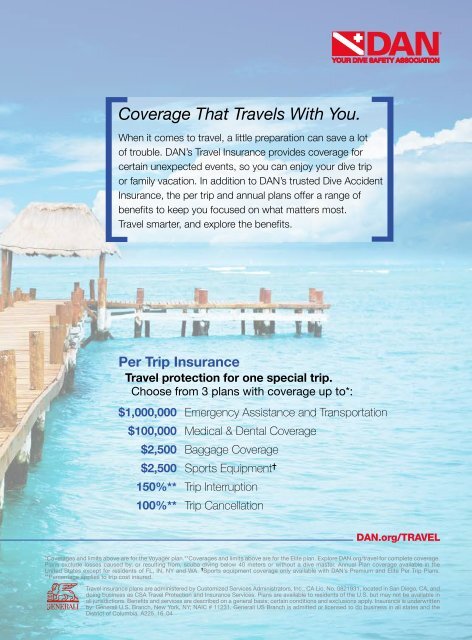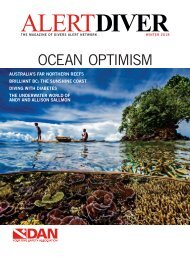AD 2016 Q2
As we pointed out in the spring 2013 edition of the Alert Diver, even being a dive buddy has potential legal implications. So, to bump this up a notch, what about the diver training organisations themselves? Where do they stand? How do they relate to South African law? Are they all considered the same under our legal system in spite of the differences in organisational structures and training programmes? How does this affect their respective instructors and trainee divers from a legal perspective? These are not exactly simple questions. It is certainly true that the respective training organisations differ in a number of ways. However, this does not imply that there are necessarily differential legal implications for each of them. In fact, under South African law, the legal principles are common in all matters. Therefore, if you suffer a loss and you (or your estate in the case of a fatality) wish to recover damages, the legal principles would be applied commonly; whether you are driving or diving. Although not a frequent occurrence, there have been quite a number of law suits associated with diving injuries and damages in South Africa. This is not surprising, as the occurrence of law suits is really a function of “numbers”. As training increases, so do the chances of injuries and, with it, the chances of legal recourse. So, it remains wise to insure yourself, your equipment or your business in a proper and effective way. But before getting back to the potential differences amongst the training agencies, let’s first explore the foundational legal principles on which any civil claim would be adjudicated: inherent risk, negligence and duty to take care.
As we pointed out in the spring 2013 edition of the Alert Diver, even being a dive buddy has potential legal implications. So, to bump this up a notch, what about the diver training organisations themselves? Where do they stand? How do they relate to South African law? Are they all considered the same under our legal system in spite of the differences in organisational structures and training programmes? How does this affect their respective instructors and trainee divers from a legal perspective? These are not exactly simple questions.
It is certainly true that the respective training organisations differ in a number of ways. However, this does not imply that there are necessarily differential legal implications for each of them. In fact, under South African law, the legal principles are common in all matters. Therefore, if you suffer a loss and you (or your estate in the case of a fatality) wish to recover damages, the legal principles would be applied commonly; whether you are driving or diving.
Although not a frequent occurrence, there have been quite a number of law suits associated with diving injuries and damages in South Africa. This is not surprising, as the occurrence of law suits is really a function of “numbers”. As training increases, so do the chances of injuries and, with it, the chances of legal recourse.
So, it remains wise to insure yourself, your equipment or your business in a proper and effective way. But before getting back to the potential differences amongst the training agencies, let’s first explore the foundational legal principles on which any civil claim would be adjudicated: inherent risk, negligence and duty to take care.
Create successful ePaper yourself
Turn your PDF publications into a flip-book with our unique Google optimized e-Paper software.
[ ]<br />
Coverage That Travels With You.<br />
When it comes to travel, a little preparation can save a lot<br />
of trouble. DAN’s Travel Insurance provides coverage for<br />
certain unexpected events, so you can enjoy your dive trip<br />
or family vacation. In addition to DAN’s trusted Dive Accident<br />
Insurance, the per trip and annual plans offer a range of<br />
benefits to keep you focused on what matters most.<br />
Travel smarter, and explore the benefits.<br />
Per Trip Insurance<br />
Travel protection for one special trip.<br />
Choose from 3 plans with coverage up to*:<br />
$1,000,000 Emergency Assistance and Transportation<br />
$100,000 Medical & Dental Coverage<br />
$2,500 Baggage Coverage<br />
$2,500 Sports Equipment ✝<br />
150%** Trip Interruption<br />
100%** Trip Cancellation<br />
DAN.org/TRAVEL<br />
*Coverages and limits above are for the Voyager plan.**Coverages and limits above are for the Elite plan. Explore DAN.org/travel for complete coverage.<br />
Plans exclude losses caused by, or resulting from, scuba diving below 40 meters or without a dive master. Annual Plan coverage available in the<br />
United States except for residents of FL, IN, NY and WA. ✝ Sports equipment coverage only available with DAN’s Premium and Elite Per Trip Plans.<br />
**Percentage applies to trip cost insured.<br />
Travel insurance plans are administered by Customized Services Administrators, Inc., CA Lic. No. 0821931, located in San Diego, CA, and<br />
doing business as CSA Travel Protection and Insurance Services. Plans are available to residents of the U.S. but may not be available in<br />
all jurisdictions. Benefits and services are described on a general basis; certain conditions and exclusions apply. Insurance is underwritten<br />
by: Generali U.S. Branch, New York, NY; NAIC # 11231. Generali US Branch is admitted or licensed to do business in all states and the<br />
District of Columbia. A225_16_04









